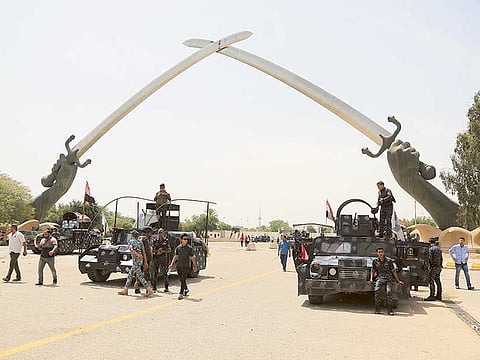Green Zone breach exposes Iraq’s growing political paralysis
Analyst says protests work in favour of Al Abadi to push through with reforms

Dubai: The hundreds of protesters who pulled down blast walls and forced their way into Baghdad’s Green Zone on Saturday laid bare growing political chaos that increasingly poses a threat to the country’s security and the economy. Here is what you need to know about the first major breach of the country’s fortified administrative heart.
What does it mean for the political process?
Shiite cleric Moqtada Al Sadr’s supporters led the breach, demanding more efforts to fight corruption and to protest what they regard as sectarianism in the selection of government ministers. The unrest heaps more pressure on Prime Minister Haidar Al Abadi to break a political stalemate that’s preventing him from appointing a government of technocrats to steer the fight against Daesh and revive the economy. Al Abadi’s push has been blocked by parties seeking to preserve the country’s traditional system of patronage.
“This isn’t necessarily Al Sadr positioning himself against Al Abadi, they are both looking for the same sort of process,” Stephen Royle, a Middle East analyst at Control Risks, said in a phone interview from Baghdad. “In a strange sort of way, it works in favour of Al Abadi to use Moqtada Al Sadr and public support to push through with these reforms.”
What does it mean for the war on Daesh?
The government’s failure to secure the country’s administrative centre poses questions about its ability to battle Daesh. The terror group captured Mosul — Iraq’s biggest northern city and the largest under Daesh’s control outside Syria — almost two years ago, and the longer the political crisis drags on in Baghdad, the harder it becomes to dislodge them.
What does it mean for the economy?
Prolonged unrest may affect Iraq’s ability to secure a much-needed loan agreement from the International Monetary Fund that could also help the country tap international debt markets. Growth slumped to 2.4 per cent last year compared with an average of 12.7 per cent from 2000-12, according to IMF data. A projected rebound this year will be powered entirely by crude as the non-oil industry shrinks 5 per cent, a third consecutive annual contraction. Gross government debt is projected to reach 93 per cent of economic output this year, more than any other major oil-exporter and second only to Lebanon in the Middle East and North Africa, according to the IMF.
What does it mean for Iraq’s oil industry?
The fighting and political unrest haven’t dented crude production, which is based in the south of the country. Exports approached a record high in April, with shipments from Opec’s second-biggest producer rising to 3.36 million barrels a day, or 101 million barrels for the month, Asim Jihad, a spokesman at the oil ministry, said on Sunday. The IMF estimates Iraq’s oil gross domestic product will expand 15.8 per cent in 2016, the second-highest rate in the Middle East and North Africa after neighbouring Iran, with production rising to 4.05 million barrels a day this year from 3.5 million barrels in 2015.
What does it mean for Green Zone security?
Even though the protest was largely peaceful, a breach of the Green Zone raises alarm bells. Following the ouster of Saddam Hussain in 2003, the area was a symbol of American power in the country and later of the growing influence of the country’s new governing elite. Sa’ad Maan, a senior Iraqi security official, said on television that his priority was to “preserve the state’s institution” and “provide total security to all embassies.” The US Embassy has said it’s monitoring the situation, and that reports of personnel being evacuated are inaccurate.
Demonstrators have gathered about a kilometre from parliament, indicating a “level of coordination” between the protesters and security forces, said Royle at Control Risks. “We expect this protest movement will continue for at least the short term and eventually a balance would have to be sought between parliamentarians,” he said.
Sign up for the Daily Briefing
Get the latest news and updates straight to your inbox



